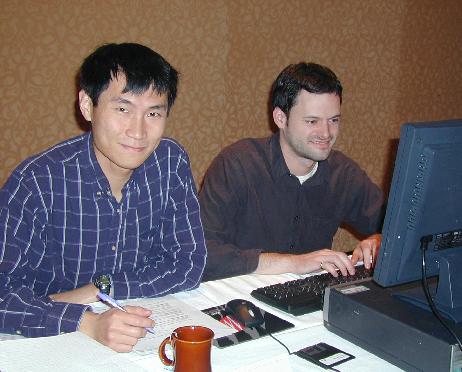
Sponsored by SIGDA
SIGDA Liaison
Prof. Igor Markov
|
|
CADathlon 06 First Place Winners
Team:
SPYONSIS
Team Member: Donald Chai
Advisor: Andreas Kuehlmann
University: University of California, Berkeley
Team
Member: Satrajit Chatterjee
Advisor: Robert Brayton
University: University of California, Berkeley
|

|
Donald
hails from Brooklyn in New York City, meaning he properly
pronounces phrases such as "orange", "Super Mario Brothers", and
"forget about it". After being imbued with super EE and CS powers at
Cornell University, he decided to take up surfing and somehow ended
up in Berkeley, on the wrong end of California. There, he probes the
deep mysteries of design automation under the watchful (and
infinitely patient) eye of Andreas Kuehlmann. He received his MS
degree and will get his PhD Real Soon Now.
Sat
is a Ph.D. candidate in Computer Science at U. C.
Berkeley working with Professor Brayton. Currently he is preoccupied
with
algorithms for logic synthesis. He graduated with the B. Tech and M.
Tech
degrees from the Indian Institute of Technology, Bombay in 2001.
CADathlon 06 Runner-Ups (second-place)
Team: iCAD
Team Member:
Kai-Hui Chang
Advisors: Igor Markov and Valeria Bertacco
University: University of Michigan
Team Member: George Viamontes
Advisors: Igor Markov and John Hayes
University: University of Michigan
|

|
Kai-hui
is a PhD candidate in the Electrical Engineering and
Computer Science Department at the University of Michigan. He has MS and
BS degrees in Electrical Engineering from National Taiwan University. His
current research interests include verification and physical synthesis.
George
is a PhD candidate in the Electrical Engineering and
Computer Science Department at the University of Michigan. He is working
to develop algorithms that exploit implicit problem structure to simulate
quantum-mechanical phenomena efficiently and has done some of this
research at Los Alamos National Laboratory. He has an MS in computer
science and engineering from the University of Michigan. He is a member
of the IEEE and ACM.
|


